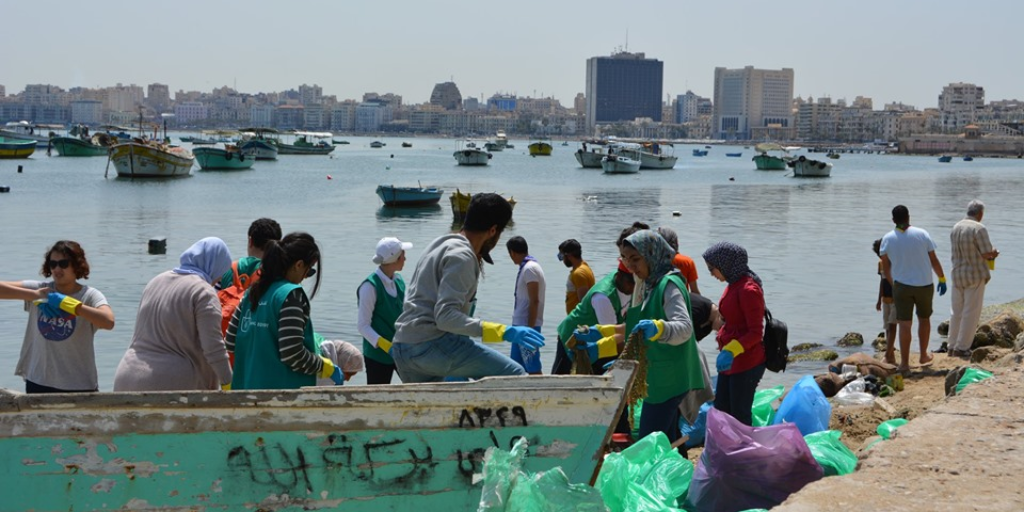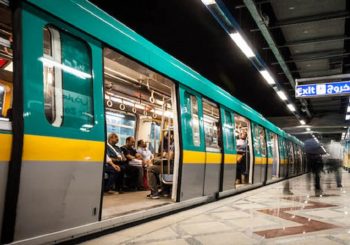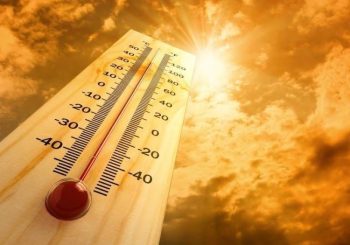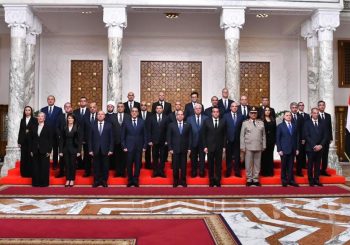It has been suggested that by 2050, there will be more plastic in the world’s oceans than fish – and Egypt plays a role in this crisis. A 2019 report from the World Wide Fund for Nature (WWF) revealed that Egypt is the biggest contributor in terms of waste mismanagement of all Mediterranean countries, with the coastal city of Alexandria leaking an average of 12.7 kilograms of plastic into nature per person.
This is where Banlastic comes in. The Alexandria-based social enterprise has one clear goal, which is working towards the eventual ban of single-use plastics in Egypt. Ahmed Yassin, one of the founders, told us about Banlastic’s vision.
“We launched Banlastic in Alexandria in 2018 in response to the plastic pollution which is infesting our seas. Not only this, but we discovered in 2017 that storm drainage systems in the city were badly blocked with plastic bags,” says Ahmed.
“We realised that we can’t stand still and not try to find a solution to the prominence of single-use plastic.”
Those behind the social enterprise have been working tirelessly to find innovative solutions, including through advocacy for legislative change. Egypt’s Minister of Environment Yasmin Fouad announced in March 2021 that Banlastic will join the Ministry in the initiation of a project to reduce plastic waste across Egypt’s coastal regions in cooperation with the World Bank.
Banlastic has also been confronting the problem of plastic pollution at a community level. After noting a significant lack of online content in Arabic surrounding the issue, they have been working to increase this. Also, as of 2018, Banlastic has run 15 beach cleanups with a total of almost 2,000 kilograms of plastic collected, and has held over 20 educational workshops to spread awareness. The organisation has worked with varying sectors of society, from school children to cleaning staff at Alexandria University to highlight the importance of segregating waste.
Ahmed believes strongly in the importance of this public outreach. “These parts of the community are not necessarily all environmental activists, they’re just people who care. And they truly want to be part of the equation,” he explains.
Ahmed adds that Banlastic currently working with shop owenrs to trial the use of plastic-free alternatives on Fouad Street in downtown Alexandria.
“We’re challenging the shops to use plastic alternatives for free for a month, and are supporting others economically in replacing their single-use plastic products such as forks and bags with more environmentally friendly alternatives,” says Ahmed.
“Shop owners have responded to it positively, they really want to be part of this.”
He also describes how Banlastic are working with various corporations and even diplomatic missions, such as the British Embassy “to advise these organisations on waste reduction and management”.
Although there has been enthusiasm amongst parts of the community involved with Banlastic, Ahmed stresses that there is still much work to be done in challenging existing attitudes towards plastic usage in Egypt.
“Sometimes, if you were to refuse a plastic bag in a supermarket, it can be interpreted as insulting. Or if a food delivery doesn’t contain plastic forks and spoons, people can feel that they’re not getting what they paid for. There is a great culture of generosity amongst Egyptians and it can be taboo to refuse an offer of something free,” he says.
“Also, we sometimes have to change our tone to get through to people. We’ve started using language of health [as well as environmental discourse] to raise more awareness about how damaging plastic can be, for example, that one can become vulnerable to cancer through ingestion of microplastics.”
The presence of zabbaleen, informal workers who sort through rubbish and re-sell it to be recycled must be carefully navigated. Ahmed explains that to accommodate them, “we need to segregate rubbish from the source”, so that they are able to find their share of plastic without being exposed to harmful substances or even disease by the process of searching through rubbish bags.
Despite these challenges, Ahmed says that Banlastic has made great progress in tackling these issues so far alongside a community of volunteers hundreds-strong. There are many ways for everyone to get involved, from buying Banlastic’s reusable tote bags available on their website, to dedicating time to volunteering at events.
“Volunteers are one of the most important elements of what we do,” says Ahmed. “Not only with beach cleanups and workshops, but also by spreading the word, which is crucial to empowering our cause.”
To learn more and shop Banlastic’s plastic-alternative products, visit their website here. Information about volunteering events can be found on their Facebook page.






Comments (5)
[…] Banlastic: Leading the Fight Against Egypt’s Plastic Problem Egyptologist Zahi Hawass Announces Discovery of Lost ‘Golden’ City in Luxor […]
[…] Banlastic: Leading the Fight Against Egypt’s Plastic Problem Egyptologist Zahi Hawass Announces Discovery of Lost ‘Golden’ City in Luxor […]